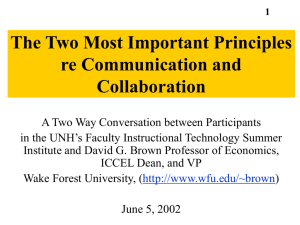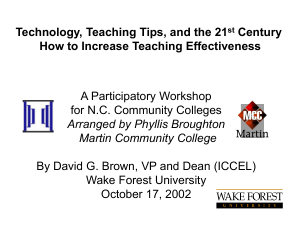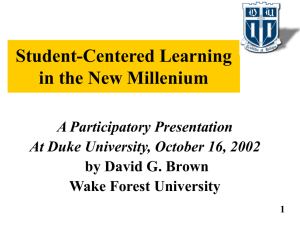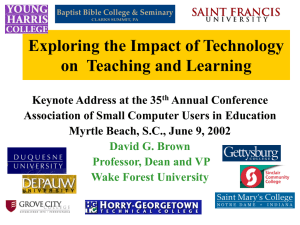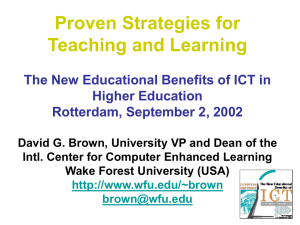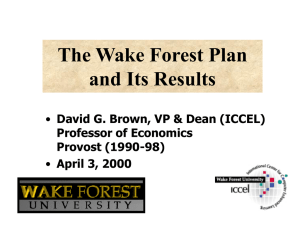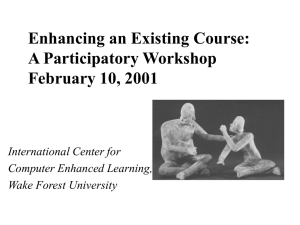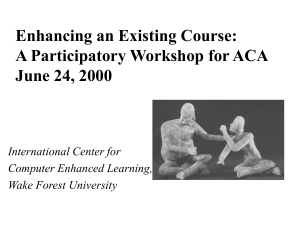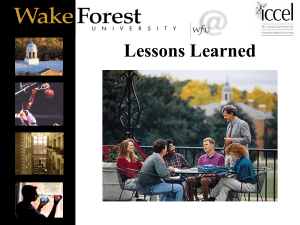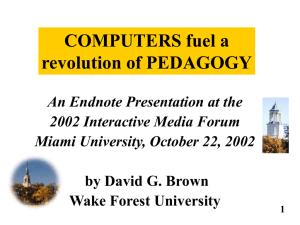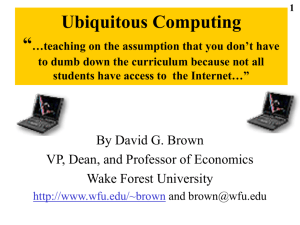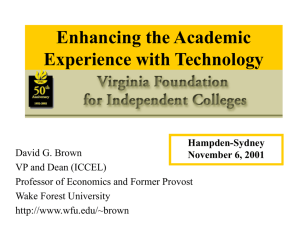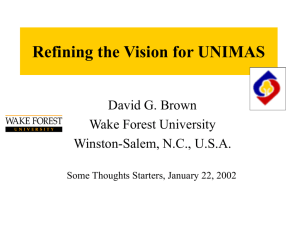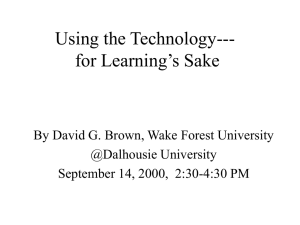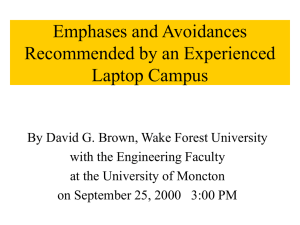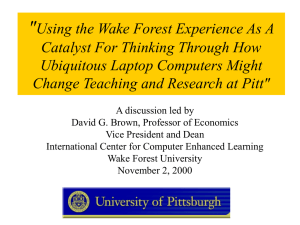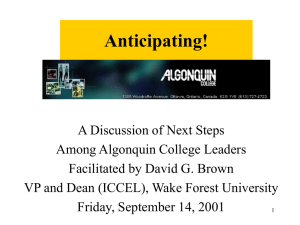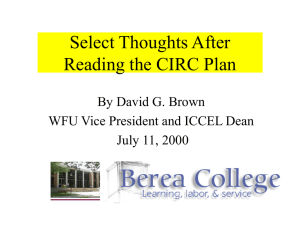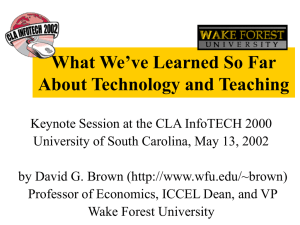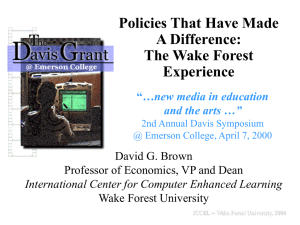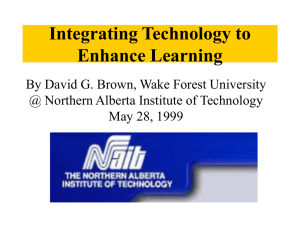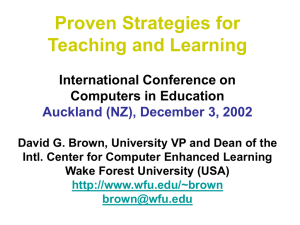Five Simple Strategies for Enhancing Learning with Technology
advertisement
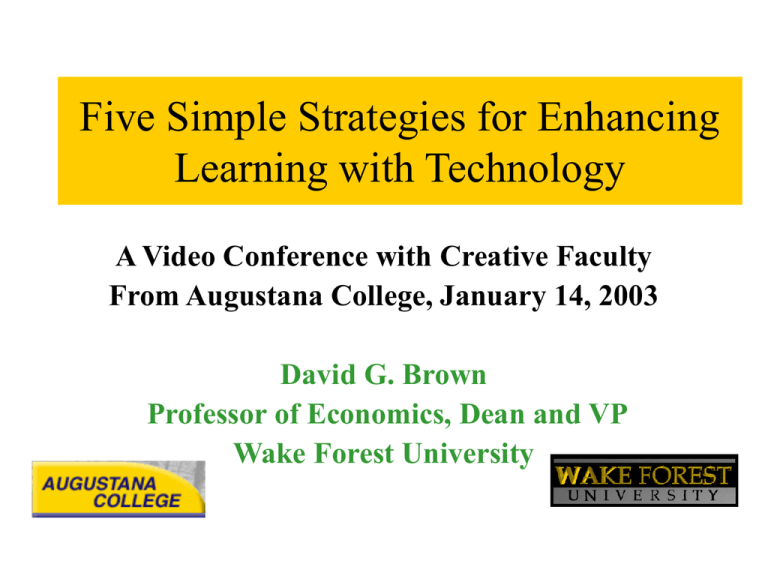
Five Simple Strategies for Enhancing Learning with Technology A Video Conference with Creative Faculty From Augustana College, January 14, 2003 David G. Brown Professor of Economics, Dean and VP Wake Forest University 2 Opening Comments 3 How has the computer changed teaching and learning? (my answer) 1. It’s caused every teacher to rethink & redesign. 2. By increasing student options, it has increased competition and compelled universities to pay more attention to the quality of teaching Our profession has been changed forever! 4 Research Results • University of Central Florida--Hybrid courses win! (the 80-20 rule) • 18,844 students at 71 American Universities--More “good practices” for wired students! • 150 professors at 50 Research Universities--Interaction, Collaboration, Debate, Custom, Adjuncts! • Virginia Polytechnic University--Calculus failure rate cut by 44%! 5 Multi-Institutional Studies – Hu and Kuh (CSEQ data from 18,000+ students) http://epaa.asu.edu/epaa/v9n49.html – CSEQ Questionnaire http://www.indiana.edu/~cseq/overview.html and http://www.indiana.edu/~nsse/html/mbp/confra1.html – Brown (150 professors from 36 universities) http://www.ankerpub.com/books/brown.html – Flashlight Project of the TLT Group http://www.tltgroup.org/programs/flashlight.html 6 Communication-Interaction Computers Enhance Teaching & Learning Via-Presentations Better--20% More Opportunities to Practice & Analyze--35% More Access to Source Materials via Internet--43% More Communication with Faculty Colleagues, Classmates, and Between Faculty and Students--87% ICCEL ICCEL --- Wake Wake Forest Forest University, University, 2003 2003 7 Computers allow people---• to belong to more communities • to be more actively engaged in each community • with more people • over more miles • for more months and years • TO BE MORE COLLABORATIVE ICCEL -- Wake Forest University, 2003 8 The Five Strategies Reasons 150 Professors Added Computer Enhancements 9 1. Communication-Interaction 2. Collaboration-Teams 3. Controversy-Debate 4. Customization-Diversity 5. Consultants-Adjuncts 2002 http://www.ablongman.com/professional/catalog/academic/product/1,4096,0205355803,00.html 10 FIRST YEAR SEMINAR The Economists’ Way of Thinking: • To understand a liberal arts education as an opportunity to study with professors who think by their own set of concepts • To learn how to apply economic concepts • To learn how to work collaboratively • To learn computer skills • To improve writing and speaking Students = 15 All Freshmen Required Course Before Class During Class. After Class Brown’s First Year Seminar • Before Class – Students Find URLs & Identify Criteria – Interactive exercises – Muddiest Point – Lecture Notes – E-mail dialogue – Cybershows • During Class – – – – One Minute Quiz Computer Tip Talk Class Polls Team Projects • After Class – – – – Edit Drafts by Team Guest Editors Hyperlinks & Pictures Access Previous Papers • Other – – – – – – Daily Announcements Team Web Page Personal Web Pages Exams include Computer Portfolio Materials Forever ICCEL -- Wake Forest University, 2003 11 12 Communication-Interaction •1247 emails •Announcements •Muddiest •One Minute Quiz •Reaction to Talk •Student Profiles Blackboard 13 Collaboration-Teams •Professors Share Resource Materials •Students Study Together •Departments Create Shared Databases Examples--•2 Students Submit 1 Answer •Edit Rough Draft Papers •PowerPoint in Class •Listserv Between Classes •Public Web Page 14 Controversy-Debate •Cross-Culture Projects •More Class Time •Best Web Sites •Threaded Discussion •Chat in Class •Double Jeopardy Quiz 15 Customization-Diversity •Cybershows (lectures, preview) •Personal Notes (email again) •Hierarchy of Help •Hyperlinks •Just In Time Teaching 16 Consultants-Adjuncts •Alumni Editors •Globe Theatre •Session with Expert •Disciplinary Colleagues •Previous Students 17 Comments and Questions 18 The Millennium Context • • • • • • • Personal. Customized. Interactive. Student-Centered Curriculum & Databases Teams of Professionals to Support Learning “Houses” instead of Disciplines Blended Courses (80-20 and 20-80) Loose-leaf Collections of Course Chunks Internet Savvy Students (Nintendo) Circle 3 Ideas That Most Deserve Your Personal Attention! 19 The Good News is that the Highest Benefit uses of the computer are among the Least Costly. • • • • • • Don’t Fear Distance Learning (Blended Wins) Pursue the Low Hanging Fruit (Email, URL, CMS) Teach on the Assumption of Internet Access Declare a Standard Hire Students Promote Information Fluency 20 Low Hanging Fruit [within the constraints of time & money] 1. URLs 2. Email 3. Course Management System Better 85% Some Use Vs 5% Heavy Use 21 Student Teacher •My.yahoo •Custom learning team •Custom delivery •Custom learning resources Student-Centered Learning in the New Millennium David G. Brown Wake Forest University Winston-Salem, NC 27109, USA 336-758-4878 email: brown@wfu.edu http//:www.wfu.edu/~brown fax: 336-758-5012 Wake Forest University, 2003
